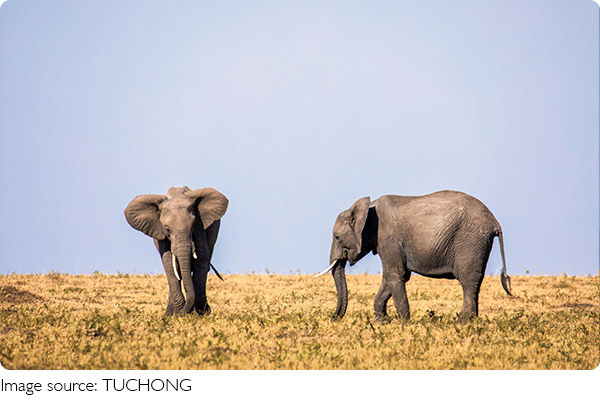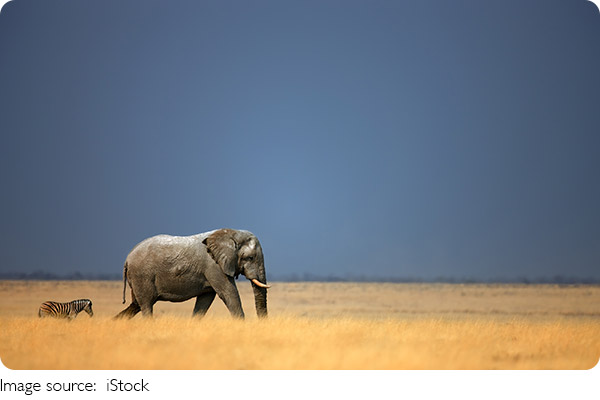Elephants Never Forget?

Can you remember what you had for lunch two weeks ago? Most of us can't. But elephants?
They might not only remember the exact location of a waterhole they visited 20 years ago but also recognize a long-lost friend after decades apart.
These massive creatures are often described as the archivists of the animal kingdom—and for good reason.
Let's explore how strong elephant memory really is, how it helps them survive, and what science says about the brain behind their extraordinary recall.
1. Memory That Saves Lives
Elephant memory isn't just a party trick—it's survival.
Finding water in droughts
In Africa's dry season, when water becomes dangerously scarce, older matriarchs often lead their herds to distant water sources that younger elephants have never seen. Researchers have observed matriarchs guiding their families to hidden watering holes based on memory of past droughts—even if it's been 10 or 20 years. Their long-term memory can make the difference between life and death for an entire herd.
Avoiding danger
Elephants can remember locations where family members were attacked or where dangerous predators lurk. This mental mapping helps them avoid risky territories and learn from past experiences, even years later.
2. Social Smarts: Recognizing Friends and Foes
Elephants live in tight-knit family groups, and they recognize not only their immediate relatives but also extended kin and old acquaintances.
Facial recognition—even after decades
In one famous case, two elephants that had performed together in a circus were reunited after 23 years. When they saw each other again, they immediately showed excitement, entwining trunks and rumbling loudly—a clear sign of recognition and emotional memory.
Distinguishing hundreds of voices
A 2014 study from the University of Sussex found that elephants can distinguish between the voices of different human ethnic groups. They even respond differently based on whether the voice belongs to a man, woman, or child. This shows not just memory, but the ability to associate sound with threat levels.
Why Are Elephants So Good at Remembering?
Their impressive recall is tied to both the structure and size of their brains.
Massive brain, smart design
Elephants have the largest brains of any land animal—averaging 10.5 pounds. But it's not just about size. Their temporal lobes, responsible for memory, are exceptionally well developed—more so than in humans. These lobes allow them to store, sort, and recall information with high efficiency.
Role of the matriarch
In elephant societies, knowledge is often passed down through the eldest female, known as the matriarch. Her experience—stored in long-term memory—guides the herd through complex decisions. Without her, younger elephants may struggle to find food or handle social challenges.
Scientific Backing
Researchers have confirmed elephants' memory through both field observation and controlled experiments.
Amboseli National Park study
Scientists in Kenya tracked elephant families over multiple decades and found that herds led by older matriarchs had significantly higher survival rates. These matriarchs remembered the timing and location of past droughts and could lead their families accordingly.
Long-term social memory
A study published in Proceedings of the Royal Society B showed that elephants can recognize as many as 100 different individuals by smell and sound. That level of social memory is rare in the animal kingdom and rivals that of some primates.
More Than Just Memory: Emotional Intelligence
Elephants' memories are deeply emotional. They mourn their dead, revisit gravesites, and remember trauma. In sanctuaries, rescued elephants have shown signs of PTSD-like behavior years after trauma or loss. Their memory isn't just logical—it's tied to strong emotional connections.
Why It Matters for Us
Understanding how and why elephants remember could offer insight into human cognition, aging, and even neurodegenerative diseases like Alzheimer's.
Scientists studying elephant brains hope to unlock more clues about how long-term memory is stored and preserved, potentially guiding breakthroughs in medical research.
But there's another urgent angle: protecting elephants. With habitat loss and poaching still threatening their numbers, preserving matriarchal knowledge is key to herd survival. When older elephants are killed, it's not just a life lost—it's a library burned.

Final Thought
Elephants don't carry notebooks or take photos—but their minds are rich with maps, faces, and memories that span decades. Their intelligence and emotional depth make them one of the most awe-inspiring animals on Earth.
The next time someone says, "elephants never forget," remember—it's more than a saying. It's a superpower.
Have you ever witnessed an animal show signs of memory or recognition? You might be surprised how much they remember. Let me know your story.
-
 Whale SongsHow whale songs are complex communication, not just melodies, revealing their social lives beneath the waves!
Whale SongsHow whale songs are complex communication, not just melodies, revealing their social lives beneath the waves! -
 Tortoise SecretsDiscover why tortoises live so long and what their slow lifestyle teaches us about longevity!
Tortoise SecretsDiscover why tortoises live so long and what their slow lifestyle teaches us about longevity! -
 Lion LifeThink male lions do nothing? Discover the hidden structure behind every lion pride's survival!
Lion LifeThink male lions do nothing? Discover the hidden structure behind every lion pride's survival!